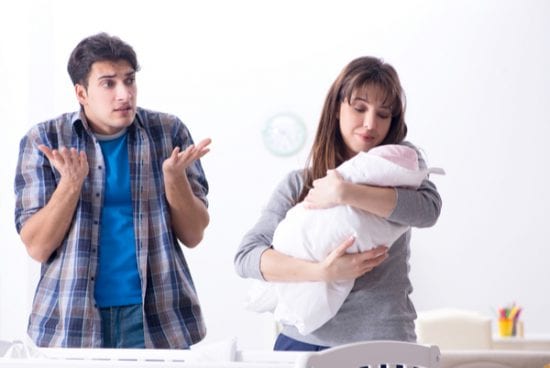Praising Daddy’s early attempts at parenting a baby can be a boon to the quality of his parenting later on. So says a study on maternal gatekeeping conducted by researchers at Ohio State University. Fathers who felt criticized for their early parenting efforts six months earlier, got lower marks parenting their 9-month-old babies. In other words, the way a new mom reacts to dad’s interactions with a newborn, affects his later parenting skills. Or dumbed down even more: Moms are still the gatekeepers of parenting.
Now this study didn’t involve just any old parents, but two-income first time parents who were both highly educated and relatively well off. The kind of people you’d expect to be enlightened enough to be sharing equal responsibility for parenting and housework. The point of the study was to show how a mother’s attitude and behavior can either support or limit a father’s involvement in the rearing of his own child. Lead author of the study, Lauren Altenburger, who did this work as a doctoral student in human sciences at OSU says that, “Mothers may not even be aware of how their criticisms of the father may end up negatively influencing how dads parent.”
The study was published May 9, 2018, in the online Journal of Child and Family Studies.
Moms As Gatekeepers
Co-author Sarah Schoppe-Sullivan, professor of human sciences at Ohio State says the study results show us that moms are still the gatekeepers, still queen when it comes to deciding who has the most power and influence in raising a couple’s children. “Many fathers may be more vulnerable to criticism than mothers are because there is still less support in our society for fathers as active, involved parents,” says Schoppe-Sullivan.
The data used for this study was culled from the New Parents Project, a long-term research project led in part by Schoppe-Sullivan. The New Parents Project aims to find out how dual-income couples cope with first-time parenting. It’s a smallish study with just 182 couples, most of them married. The participants in this project are assessed twice: when the baby is 3 months old and when the baby is 9 months old.
Dads And Maternal Gatekeeping
During the two assessment periods, dads answered questions designed to show just how far moms “opened” or “closed” the gate to their involvement in baby’s care. A father, for instance, had to note how often a mom took over a baby-related task because he wasn’t doing it right, or how often mom cast an irritated look at dad in relation to his parenting. Taking over or using negative facial expressions or body language were deemed examples of mom “closing the gate” to a father’s parenting involvement. Examples of opening the gate might include mom encouraging dad to help her bathe the baby, or words of appreciation for a father’s help in parenting the child.

In addition to the questionnaires, the researchers watched fathers interact with baby for 3-minute intervals at 3 months and 9 months. Dads were given marks according to how they responded to the baby’s facial expressions and gestures; how engaged they were with the baby; and how often they smiled at or spoke with warmth to baby.
The study findings show that the more gate-closing by a partner when the baby was 3 months old, the worse the marks fathers received on parenting when baby turned 9 months. “If fathers feel their partners don’t have confidence in their parenting, they may withdraw, and become less positive and sensitive with their child,” says Altenburger.
Maternal Gatekeeping Over Time
One theory this study looks at is whether moms close the gate on dads because of a father’s poor parenting. According to the researchers, if this had been the case, moms would still be closing that maternal gate, that is to say turning away a dad’s help, at 9 months, which was not the case. But to this writer’s mind, this argument is flawed. There are many reasons why a mom would be more accepting of a dad’s parenting help with an older baby.
For one thing, new moms are nervous in general, whereas by 9 months, a mom is no longer “new.” She feels more confident and has a routine going. For this reason alone, a mother is more likely to “close the gate” to a father’s involvement with a three-month-old and more inclined to accept his help with an older baby.
Then again, a newborn is not a nine-month-old. Parents, even those who are not new to parenting, are more nervous about newborns. With a newborn, you worry about supporting their heads, not dropping them, keeping them warm enough, and trying to understand their unspoken needs. A three-month-old seems fragile compared to a nine-month-old. A mother may not trust anyone else’s parenting with a new baby, believing that only she can provide for her infant.

With a nine-month-old, on the other hand, there’s more room for letting dad give parenting a whirl. A nine-month-old is not as fragile as a three-month-old infant. There’s not the same fear involved in, for instance, bathing a nine-month-old, as there is with bathing a three-month-old.
For these reasons, it seems easy understand why a mom would be more accepting of a partner’s parenting help as a baby grows older. There are, in fact, few reasons to suggest a mom would regard a father’s help in the same light at these two very different stages of a child’s development. Asked to comment on this point, Altenburger declined to respond.
Low-Income Gatekeeping
Schoppe-Sullivan, meanwhile, notes that dual-earner couples may differ from other families in regard to co-parenting. “We might see more evidence of protective gatekeeping by mothers in more distressed families,” she said.
Schoppe-Sullivan and Altenburger say that both parents need to be supportive of each other during a first child’s first few months. It’s a time when parents, no matter whether they are moms or dads, are feeling vulnerable. They’re both trying to work out who they are as parents.
But fathers, in particular, are vulnerable to criticism, says Schoppe-Sullivan. “There still is an assumption in our society that mothers are the primary caregivers and that they have the power to determine the involvement of others in child care. Fathers may feel they should withdraw if they don’t have their partner’s support.”

If parents are to learn anything from this study, it is that moms should stop and think before criticizing a dad’s parenting choices, especially when it comes to little things like what the baby should wear on a trip to the supermarket, says Altenburger. “It is about giving fathers the space to parent, too. Both parents need to keep communication open and not be so quick to criticize.”
Found what you just read useful? Why not consider sending a donation to our Kars4Kids youth and educational programs. Or help us just by sharing!
Ohio State University. (2018, June 11). Fathers’ early parenting quality affected by mothers: Study shows importance of maternal ‘gatekeeping’. ScienceDaily. Retrieved June 24, 2018 from www.sciencedaily.com/releases/2018/06/180611133434.htm
